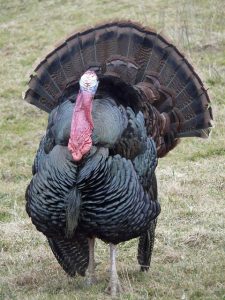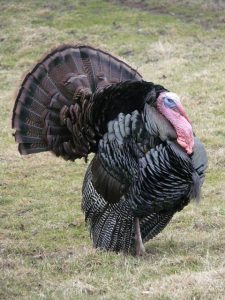All about Birds
The Most Interesting Thing About Turkeys (You Probably Did Not Know)
Did you know that turkeys are very interesting creatures? They have a lot of quirks and habits that make them unique. In this post, we will discuss some of the most interesting things about turkeys. We will also cover some of the misconceptions about these birds. So, if you are interested in learning more about turkeys, keep reading!
Turkeys are interesting creatures that have a lot of unique features
Turkeys are truly remarkable birds. They have many features that make them distinct from other birds and routinely exhibit behaviors that make them fascinating to observe. For instance, turkeys have specially adapted vision that allows them to recognize colors and light in the ultraviolet spectrum. This helps them detect food sources and predators more quickly.
In addition, their characteristic strutting behavior is thought to be an attempt to mask their smaller size with larger body movements, helping them stay safe from predators. By fluffing up their feathers and puffing out their chest, turkeys can appear much larger than they actually are. Their curious behaviors also make for great entertainment – watching a group of turkeys foraging for food or interacting with each other can provide hours of fun! All in all, turkeys are unique birds that deserve our admiration and respect.
They can be domesticated and used for their meat or feathers

Turkeys have long been an important asset to people around the world. From providing nutritious meat for family meals to providing beautiful feathers for traditional ceremonies, turkeys are a versatile species with many uses. It’s no surprise that turkeys have been domesticated in many cultures and brought into backyards all over the world.
With the right amount of care and attention, turkeys can be happy and healthy members of your home, making them popular for farmyard flocks. Whether you’re looking to raise turkeys just for their meat or their feathers, you can always count on this surprisingly intelligent bird to provide steady companionship along the way.
Not only is keeping turkeys around good for the turkeys themselves, but it may also benefit other animals in your area by providing food or habitat — turkeys are great at helping to spread seeds and control pests! So don’t underestimate this remarkable animal — they’ve been supporting humans for thousands of years, and there’s no reason they won’t continue.
Turkeys are also used as pets in some parts of the world
Turkeys have long been touted as a holiday tradition, but did you know that they can also make surprisingly enjoyable pets? Although it might seem an unlikely choice due to their size, turkeys can be incredibly playful, inquisitive, and often very friendly. People in some parts of the world keep pet turkeys in their yards or homes. When caring for pet turkeys, it is important to take special safety precautions. All cages and nesting boxes should be painted with pet-safe paint to ensure that the turkey’s respiratory system remains healthy.
Additionally, pet food should be carefully monitored so that diets remain balanced and toxins-free. Understanding the unique personality of pet turkeys is also key; some may enjoy being petted, while others prefer a more hands-off approach. With these measures, pet turkeys can make excellent companions in any home!
Some people even use turkeys as therapy animals

These days, it’s increasingly common to find therapy animals – from cats and dogs to llamas, guinea pigs, rabbits, and even turkeys. Many of us have heard of service dogs providing emotional support for people with mental illnesses, but some people are now turning to larger birds like turkeys for help. Studies have found that mental health can be improved just by spending time with animals, particularly those that are gentle and friendly.
Turkeys are surprisingly social creatures with similar personalities to cats – they’re quite independent while still enjoying physical contact with humans. According to some experts, the steady rhythm of a turkey’s heartbeat when perched on your lap can be incredibly calming and has been known to improve mental clarity. Although you won’t see flocks of turkeys in therapy offices any time soon, these birds may be the ideal therapy companions for those who need a little extra emotional support in their lives.
All animals deserve respect and can make great companions; perhaps the next time you think of therapy animals, give a warm thought to the calming presence of a turkey!
Turkeys are fascinating animals that have a lot to offer the world
Turkeys are amazing birds with a lot to offer the world. Not only are they beautiful, but their intelligence and sociability make them quite unique among avian species. For instance, turkeys can recognize over 100 individual faces and can build close-knit relationships within their respective flocks.
They also have an amazing sense of direction and can travel very long distances. Turkeys also greatly contribute to ecosystems; they help distribute seeds and propagate various plant species throughout the area.
Furthermore, their feathers provide excellent insulation for other birds, ensuring that delicate creatures can carry on living in cold climates. Altogether, turkeys are fascinating animals that should be appreciated more often for the many gifts they bring to this world!
Conclusion
Like most people, you probably think of turkeys as the Thanksgiving main course, but there’s so much more to these interesting creatures than that. Turkeys can be domesticated and used for their meat or feathers and are also used as pets in some parts of the world. Some people even use turkeys as therapy animals! Turkeys are fascinating animals with a lot to offer the world, and we hope this article has helped you learn more about them.
Check out our other blog posts to learn more about these fascinating birds. We’ll teach you everything you need to know about these amazing animals!

